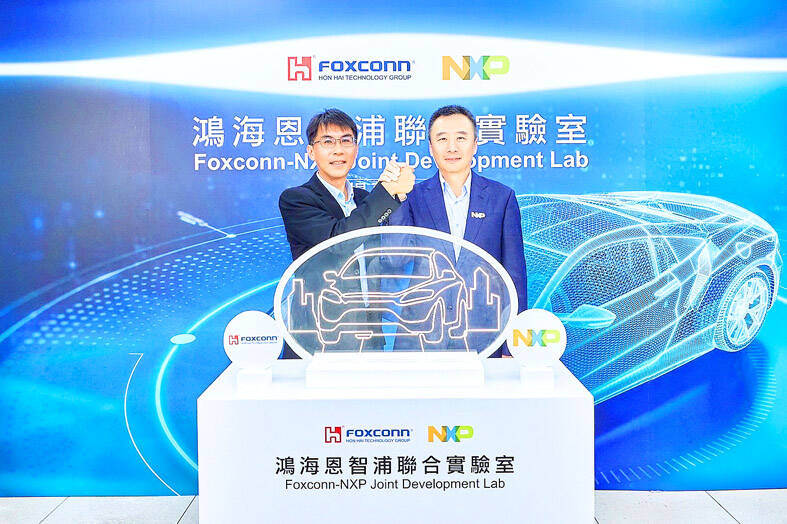NXP Semiconductors and Hon Hai Technology Group (鴻海科技集團), known internationally as Foxconn (富士康), yesterday jointly launched a laboratory in Taoyuan County’s Nankan District (南崁), deepening their strategic collaboration in bringing software-defined electric vehicles (SDEV) to the market faster.
The lab aims to accelerate Hon Hai’s efforts in software-defined electric vehicles, leveraging NXP’s comprehensive electrification portfolio and cross-vehicle system solutions using the S32G and S32K3 families for domain and zonal controllers targeting service-oriented gateways, vehicle networking and safe vehicle control, NXP said in a statement.
The collaborative lab brings together more than 200 engineers based locally and abroad from Hon Hai and NXP, the statement said.

Photo courtesy of NXP Semiconductors
The lab is to be the primary location for innovation, discussion, training and enabling new applications, it said. The equipment for the first-phase operation has been moved in the lab, it said.
“The lab will accelerate the progress of electric, software-defined vehicles from talk to reality. The auto industry has to become faster and more efficient, and NXP is pleased to extend its system solutions portfolio to enable electrification, next-generation architectures, smart and secure car access systems, and more,” NXP Semiconductors Taiwan senior sales director Elton Tsang (臧益群) said in the statement.
Demonstrating their partnerships in automotive electrification, Foxtron Vehicle Technologies Co (鴻華先進), an EV designing and manufacturing arm of Hon Hai, showcased its latest EV, the Model B, during NXP’s annual technology forum in Taipei on Tuesday, ahead of the vehicle’s commercialization next year. The Model B is equipped with NXP’s S32G and S32K3 solutions.
“We work together to create scalable platforms to enable faster time to market, to improve [production] cost in a very innovative way and to bring new cars into this rapidly growing area,” NXP global sales executive vice president Ron Martino told reporters on Wednesday.
Optimized and innovative semiconductor content would help EV original-electronic manufacturers to achieve reductions in total system costs, including software costs, he said.
The latest partnerships was an extension from a memorandum of understanding NXP signed with Hon Hai in July last year to jointly develop platforms for a new generation of smart, connected vehicles, aiming to leverage NXP’s portfolio of automotive technologies.
As the semiconductor content in each car is outgrowing the unit shipments of vehicles, NXP expects the automotive segment to be the fastest growth engine for the company next year, followed by the industrial and Internet-of-Things segment, Martino said.
The company projected that automotive segment revenue would expand at an annual growth rate of between 9 percent and 14 percent during the 2021-2024 period.
The average semiconductor content per car is expected to grow at an annual rate of 8 percent to US$1405 by 2029, up from US$909 today, Martino said, citing a Bloomberg forecast.

In Italy’s storied gold-making hubs, jewelers are reworking their designs to trim gold content as they race to blunt the effect of record prices and appeal to shoppers watching their budgets. Gold prices hit a record high on Thursday, surging near US$5,600 an ounce, more than double a year ago as geopolitical concerns and jitters over trade pushed investors toward the safe-haven asset. The rally is putting undue pressure on small artisans as they face mounting demands from customers, including international brands, to produce cheaper items, from signature pieces to wedding rings, according to interviews with four independent jewelers in Italy’s main

Japanese Prime Minister Sanae Takaichi has talked up the benefits of a weaker yen in a campaign speech, adopting a tone at odds with her finance ministry, which has refused to rule out any options to counter excessive foreign exchange volatility. Takaichi later softened her stance, saying she did not have a preference for the yen’s direction. “People say the weak yen is bad right now, but for export industries, it’s a major opportunity,” Takaichi said on Saturday at a rally for Liberal Democratic Party candidate Daishiro Yamagiwa in Kanagawa Prefecture ahead of a snap election on Sunday. “Whether it’s selling food or

CONCERNS: Tech companies investing in AI businesses that purchase their products have raised questions among investors that they are artificially propping up demand Nvidia Corp chief executive officer Jensen Huang (黃仁勳) on Saturday said that the company would be participating in OpenAI’s latest funding round, describing it as potentially “the largest investment we’ve ever made.” “We will invest a great deal of money,” Huang told reporters while visiting Taipei. “I believe in OpenAI. The work that they do is incredible. They’re one of the most consequential companies of our time.” Huang did not say exactly how much Nvidia might contribute, but described the investment as “huge.” “Let Sam announce how much he’s going to raise — it’s for him to decide,” Huang said, referring to OpenAI

The global server market is expected to grow 12.8 percent annually this year, with artificial intelligence (AI) servers projected to account for 16.5 percent, driven by continued investment in AI infrastructure by major cloud service providers (CSPs), market researcher TrendForce Corp (集邦科技) said yesterday. Global AI server shipments this year are expected to increase 28 percent year-on-year to more than 2.7 million units, driven by sustained demand from CSPs and government sovereign cloud projects, TrendForce analyst Frank Kung (龔明德) told the Taipei Times. Demand for GPU-based AI servers, including Nvidia Corp’s GB and Vera Rubin rack systems, is expected to remain high,